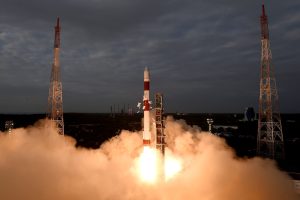Since the arrival of Prime Minister Narendra Modi on the national scene in India in 2014, the Middle East and North Africa (MENA) region, or West Asia has emerged as a fulcrum of activity for the Indian government. While the traditional view holds that India’s engagement with the region is primarily focused on economics, especially energy, recent events suggest that science and technology, especially convergence on issues concerning space, are increasingly dominating the narrative.
With most states in the Middle East starting their space programs in recent years, India has emerged as a reliable partner for these states. That trend is only set to grow with India’s successful landing of a rover on the Moon.
This is an interesting development, for it points to the larger pattern of novel engagement between India and MENA. These relationships are not just based on just questions of energy security but also on broadening and deepening ties in non-traditional security sectors, especially the space sector.
For example, India and the United Arab Emirates (UAE) have demonstrated a growing convergence on issues of space collaboration. The “Abu Dhabi Space Debate” in 2022 saw a commitment from the Indian side envisaging greater cooperation on space between India and the UAE. India also reiterated how India’s Polar Satellite Launch Vehicle (PSLV) launched the UAE’s first nano-satellite, Nayif-I, in order to collect environmental space data.
Similarly, India and Egypt are also likely to partner with each other in the non-traditional security domain of space, with research in space science and satellite communication emerging as important parts of this new emerging partnership.
A memorandum of understanding (MoU) already exists between Saudi Arabia’s King AbdulAziz City for Science and Technology (KACST) and Indian Space Research Organization (ISRO) that promises collaboration on satellite communications and navigation systems, as well remote sensing, meteorology, and disaster management. Along similar lines, India and Oman have also signed an MoU for India to assist Oman in space research while collaborating with this Gulf country on space science, remote sensing, and satellite-based navigation.
India and Israel have also collaborated on space research, with both countries coming together to launch an electric propulsion system (EPS) and a geosynchronous earth orbit-low orbit link in 2022. India had earlier used Israeli technology for RISAT-2, a radar-imaging satellite that boosted India’s defense capabilities.
Kuwait too has expressed its interest in finding convergence with India in space. The Kuwaiti ambassador to India, Jasem Al Najem, has spoken about possible partnerships with India in the space sector. He praised India for its extensive expertise in space, calling it “one of the world’s five most technologically advanced nations in the space sector.” He reiterated the country’s strong track record, noting the fact that India has launched 342 satellites from 34 countries using the Indian PSLV between 1999 and December 2021.
India also has an agreement with Tunisia to “explore outer space for peaceful purposes.” According to the Indian government, “The agreement will enable cooperation in space science, technology, and applications in areas such as remote sensing of the earth; satellite communication and satellite-based navigation; and space science and planetary exploration.”
Interestingly, ISRO’s success in initiating an inexpensive yet successful space program for India has made different Middle Eastern countries take note of India. According to ISRO’s official website, it has successfully launched 124 satellites including the indigenous Chandrayaan and Mangalyaan missions – India’s lunar probe and Mars orbiter missions. The success of these initiatives piqued the interest of different countries who wish to gain from India’s experience in the spatial domain.
Space as a domain has provided India the opportunity to broaden and deepen its ties with the Middle East. Since most of the MENA countries have nascent space programs at the moment, India can share its wider expertise with these states and cooperate on issues concerning space and outer space without securitizing the domain.
India could provide its launch vehicles for indigenous satellite launches in consortium with the ISRO and Indian National Space Promotion and Authorization Center (IN-SPACe) – the commercial arm of the ISRO. This could be a profitable deal for the ISRO-INSPACe, as further deals will entail further commercialization of the Indian space sector – propelling India’s continued rise as a space power.
India and the Middle Eastern states can further collaborate and launch satellites together to comprehend weather patterns and provide forecasting as well as geospatial navigation, among others.
Similarly, the Indian private sector in space can also share its expertise with their Middle Eastern counterparts – enabling the creation of an ecosystem that embeds India and MENA countries into global supply chains in the space sector. A precedent has already been set by a Chennai-based aerospace and defense parts start-up company signed a deal with the UAE to supply structural components for making payloads and satellite casings for rockets.
Finally, with the militarization of the space sector becoming a potential reality, India can collaborate with like minded states in the Middle East, especially Saudi Arabia and the UAE, to jointly work on satellites to build their intelligence, surveillance, and reconnaissance capabilities – thereby giving a new strategic pivot to ties in the domain of space.
As India emerges as a major space power in the years to come, this sector can become a major focus of India’s engagement with the Middle East.

































